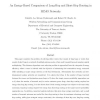Free Online Productivity Tools
i2Speak
i2Symbol
i2OCR
iTex2Img
iWeb2Print
iWeb2Shot
i2Type
iPdf2Split
iPdf2Merge
i2Bopomofo
i2Arabic
i2Style
i2Image
i2PDF
iLatex2Rtf
Sci2ools
100
Voted
CORR
2008
Springer
2008
Springer
An Energy-Based Comparison of Long-Hop and Short-Hop Routing in MIMO Networks
This paper considers the problem of selecting either routes that consist of long hops or routes that consist of short hops in a network of multiple-antenna nodes, where each transmitting node employs spatial multiplexing. This distance-dependent route selection problem is approached from the viewpoint of energy efficiency, where a route is selected with the objective of minimizing the transmission energy consumed while satisfying a target outage criterion at the final destination. Deterministic line networks and twodimensional random networks are considered. It is shown that when 1) the number of hops traversed between the source and destination grows large or 2) when the target success probability approaches one or 3) when the number of transmit and/or receive antennas grows large, short-hop routing requires less energy than long-hop routing. It is also shown that if both routing strategies are subject to the same delay constraint, long-hop routing requires less energy than short-hop...
CORR 2008 | Education | Hops | Routing | Target Success Probability |
| Added | 25 Dec 2010 |
| Updated | 25 Dec 2010 |
| Type | Journal |
| Year | 2008 |
| Where | CORR |
| Authors | Caleb K. Lo, Sriram Vishwanath, Robert W. Heath Jr. |
Comments (0)

